Many people believe that eating turkey during the Thanksgiving holiday makes you sleepy. But does it really? Here, UConn Today talks with physiology and neurobiology professor John Redden to find out.
Q. Does eating turkey really make you sleepy?
A. No. Contrary to popular belief, eating turkey doesn’t make you sleepy. It’s a great example of pseudoscience. The idea comes from the knowledge that turkey contains a lot of tryptophan. Tryptophan is an essential amino acid. We can’t make it, so we must get it from our diet.
Tryptophan doesn’t have special access [to the brain]. Imagine a crowd shoving into a store when the doors open on Black Friday. — John Redden
Tryptophan can be a template for a lot of stuff, such as hormones and chemicals inside the brain called neurotransmitters. It’s unique among amino acids in this regard. So the link most people make is that tryptophan can be converted into serotonin, which can be converted into melatonin, a hormone that regulates our sleep/wake cycles.
But turkey doesn’t actually have a particularly high level of tryptophan. It’s got less than nuts or cheese, for example. And hormones like melatonin are made in the brain, and after a big meal, tryptophan has a lot of competition from the other 19 amino acids found in turkey that are also trying to get into the brain. Passing the blood-brain barrier isn’t easy, and tryptophan doesn’t have special access. Imagine a crowd shoving into a store when the doors open on Black Friday.
Q. So does melatonin make you sleepy?
A. There are melatonin supplements available commercially that suggest they might be good for jet lag or helping you sleep, but the jury is still out on whether they’re effective or not.
Q. So why do people tend to get tired after the holiday meal?
A. We usually consume over 4,000 calories on Thanksgiving, which is almost twice the daily requirement for the average person! After we eat, blood starts to be redistributed to the gut, and your bloodstream gets flooded with hormones carrying messages between gut and brain. Some tell us how to process these nutrients.
Other hormones control hunger and satiety. Some of these hormones also work on other areas of the brain, to control alertness. In particular, orexin in the hypothalamus controls both appetite and alertness. When you feel full, orexin is inhibited, and you don’t get same high level of alertness as when you’re hungry. But it has nothing to do with the tryptophan in the turkey. A Tofurkey will make you just as sleepy as the real deal!
Q. A lot of folks, including college students, go home for Thanksgiving and go out after the holiday meal to see friends. What should (or shouldn’t) you eat and when, if you want to be alert for socializing later on?
A. You’re fighting a losing battle. It would be better to have multiple smaller meals than one large one – but the Thanksgiving chef in your family probably won’t appreciate that! And alcohol is a depressant, so if you’re drinking a lot, that’s a double whammy. I guess the best strategy is to accept your fate and take a nap. Or go out Friday night instead.



